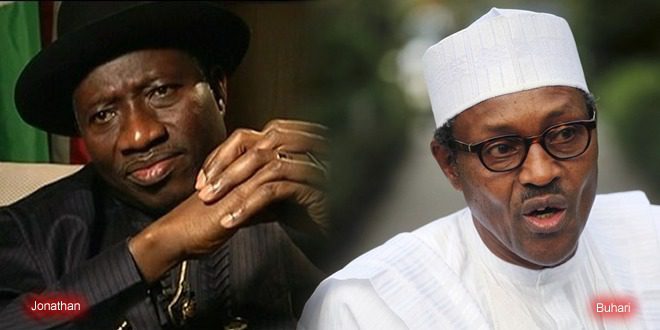Democracy & Governance
Before Buhari, Nigerians had Good Luck -By Ezinwanne Onwuka
Nigerians needn’t remind the Buhari-led APC administration of what the naira/dollar exchange rate was before their ‘super economic policies’ brought the naira to its knees. Or, perhaps, the prices of commodities before their arrival on the scene. No doubt, it has dawned on Nigerians that the ‘change’ Buhari and his party, the APC, promised meant ‘chains’.

In an earlier piece, I noted that Nigeria has been caught in the miry clay of leadership ineptitude because the present administration has demonstrated a lack of vision on how to move Nigeria forward. The last seven years have proven that President Muhammadu Buhari cannot carry the leadership burden foisted upon him by a coalition of political wheeler-dealers.
Before the general elections of March 2015, ex-president Goodluck Jonathan’s international reputation was not a strong one. He was initially an accidental president who, despite his relative inexperience, ascended to lead the country when his principal, Umaru Musa Yar’Adua, passed away in 2010.
In 2011, Jonathan surprised many observers in and outside Nigeria by securing the Peoples Democratic Party’s (PDP) ticket for the presidential election; and eventually emerging victorious. Among the candidates for the election, Jonathan appealed to the masses. His ‘I had no shoes’ speech endeared him to the majority of Nigerians, who saw him as one of them; someone who had experienced their pains and hardship.
With his campaign slogan, ‘A breath of fresh air’, Jonathan promised a break from the old, and mostly retrogressive, way the country had been governed in the past. However, his tenure was characterised by soaring insecurity and instability in northern Nigeria as the Islamic terrorist organisation based in northeastern Nigeria, Boko Haram, gained strength and territory. If anything tore the Jonathan government apart, none did as the Boko Haram insurgency. The government struggled for years for a response while the bloodthirsty group ran amok, killing, maiming and displacing Nigerians in, mostly, northern states in its bid to form an Islamic caliphate within Nigeria.
Though his administration fell largely short of expectations, Jonathan performed impressively well in office. But as the votes were counted in March 2015, he conceded defeat to Muhammadu Buhari of the All Progressives Congress (APC), famously asserting that ‘nobody’s ambition is worth the blood of any Nigerian’, an unprecedented and courageous act in Nigerian politics which caught many Nigerians and Nigeria-watchers by surprise.
Seven years after Buhari took over power, we are yet to make a scratch in addressing the nation’s teething insecurity challenges; we are yet to make a go at resolving the country’s epileptic power supply, even as we are dealing with unemployment, inflation, and poverty. Indeed, the poverty rate in the country is alarming and has never been this high. One cannot help but wonder whether the current administration’s policies and interventions are realistically pulling Nigerians out of poverty or pushing us further back into it.
Nigerians needn’t remind the Buhari-led APC administration of what the naira/dollar exchange rate was before their ‘super economic policies’ brought the naira to its knees. Or, perhaps, the prices of commodities before their arrival on the scene. No doubt, it has dawned on Nigerians that the ‘change’ Buhari and his party, the APC, promised meant ‘chains’.
In 2015, Nigerians were seduced by the deluge of honey-like and unrealistic promises of the APC. Consequently, we abandoned our first love only to realise that we were chasing shadows; that there are two senses of the word ‘change’, positive and negative, and that the APC government brought the latter. Buhari had hinged his campaign promises on three cardinal points: fighting corruption, tackling insecurity and creating jobs. It is shameful that after almost eight years in office, the more the government says it is addressing these issues, the worse it gets.
The main opposition party, PDP, was not trying to paint the ruling party black when they lamented that ‘the Buhari-led All Progressives Congress government has turned our nation into a wasteland, devastated her economy, shattered our national dreams, crushed the hope of citizens and set our country backwards.’ The statement was factual. This sentiment was also expressed by ex-president Olusegun Obasanjo who said he was embarrassed about how President Buhari is running the country, stressing that Africa’s most populous black nation is moving towards becoming a failed state. Obasanjo is, apparently, not alone. Wole Soyinka, poet, essayist and first African Nobel prize winner, concurred with the ex-president’s assessment, describing the country as a crumbling edifice on the edge of collapse.
The foregoing scorecards on the current administration prove that things have gone from bad to worse under President Buhari though the government is always quick to reel off its quotidian achievements at every slightest opportunity. This informed prominent Islamic scholar Sheik Murtala Sokoto’s description of President Buhari’s praise singers and sycophantic admirers as liars and hypocrites.
President Buhari, surrounded by an incurable and deceitful bunch of egocentric political charlatans, has done a dishonourable job in steering Nigeria’s economy. Nigerians can only hope that his successor will be able to get Nigeria back to its erstwhile place among the comity of nations: the giant of Africa.
Ezinwanne can be reached at ezinwanne.dominion@gmail.com









